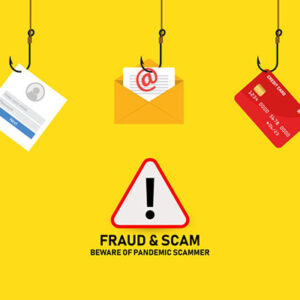COVID-19 Scams: How To Protect Yourself
May 12, 2020 | Covid-19

As the COVID-19 pandemic continues to affect our daily lives, you need to be on the lookout for scams and hoaxes that are preying on consumers during this stressful time. The Federal Trade Commission (FTC) and the Federal Communications Commission (FCC) are working to protect consumers.
Guidelines to Avoid COVID-19 Scams
Here are a few recommended guidelines to follow:
- Don’t respond to text, emails, or calls about checks from the government: Many consumers will receive checks as part of the federal government response to the coronavirus. No one should call or text you to verify your personal information or bank account details in order to “release” the funds. If you are curious about the status of your IRS stimulus payment, you can visit the IRS “Get My Payment” website.
- Ignore online offers for vaccinations: There are no products proven to treat or prevent COVID-19 at this time.
- Avoid fake COVID-19 test sites. There have been reports of fake drive-through test sites at gas stations, homeless shelters, or church parking lots. If you are seeking a test, you should go through your doctor, health insurance provider, or contact the County of San Diego for testing information. Only visit testing sites affiliated with trusted healthcare providers.
- Be wary of ads for home test kits: The FDA just announced approval for one home test kit, which requires a doctor’s order. But, most home test kits being advertised have NOT been approved by the FDA, and aren’t necessarily accurate.
- Hang up on robocalls: The FTC reports that scammers are using illegal robocalls to pitch a variety of questionable or fraudulent products and services, including low-priced health insurance, work-at-home schemes, antiviral HVAC duct cleaning, and debt-reduction plans.
- Watch out for emails claiming to be from the Centers for Disease Control (CDC) or World Health Organization (WHO): Use reputable, government sites like gov and usa.gov/coronavirus to get the latest accurate information. Do not click on links from sources you don’t know.
- Do your homework when it comes to charity donations: Always check on a charity by calling or reviewing its actual website before donating. Never donate in cash, by gift card, or by wiring money.
Additional Resources
Criminals are constantly finding creative new ways to target consumers. Every family needs to be diligent in keeping up with the latest information. Here are a few more helpful links, including examples and recordings of recent coronavirus-related scams:
- FTC Coronavirus Advice for Consumers
- FCC COVID-19 Consumer Warnings and Safety Tips
- FTC 5 Tips to Avoid a Coronavirus Scam
- AARP Reports of Fake Test Sites for COVID-19 Emerge Across U.S.
- San Diego County Warning About Economic Impact Payment Scams
- BBB Tip: Top 6 Coronavirus Scams Reported by BBB
At Windward Life Care, we are working hard to keep your family updated and safe during this pandemic. Our team is here to assist if you are looking for reputable local services and resources. Contact us to learn more.

